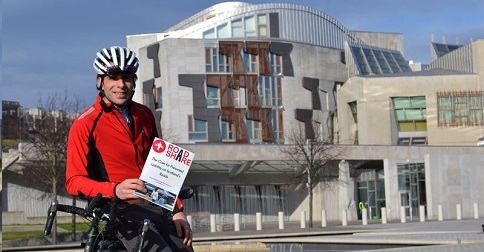
Scots won't become more active unless drivers are automatically considered responsible for accidents involving walkers and cyclists.
That's the claim for campaigners who have produced new research showing Scotland is falling behind other European countries in terms of walker and cyclist numbers, while also having less safe roads.
A total of 8,200 people have signed a petition backing the introduction of strict liability for drivers in collisions with non-motorists.
Fife adventurer Mark Beaumont presented the report and petition to the Scottish Parliament today.
The research found that the UK is increasingly lagging behind its European neighbours who have introduced road traffic liability laws in recent decades. A recent OECD report showed that successful cycling promotion depended on having the right legislation in place.
Key findings:
- UK cyclist KSI levels (killed/seriously injured) have risen steadily since 2004.
- In 2012 the number of KSI cyclists was 32% higher than the 2005 -2009 average.
- In Scotland, in 2013, serious injury to cyclists was 10% higher than the 2004-2008 average and can only partly be explained by higher levels of cycling.
- At the start of 2000, Scots walked on average 220 miles per annum. In less than 14 years, people’s walking has fallen to roughly 150 miles per annum.
- In 2000, the fatal and serious casualty rate for walkers was 12 times that for car users per mile travelled but by 2014, this ratio had risen to 19 to 1.
- Government is putting in place a large investment programme to encourage walking and cycling but progress in delivering this will be hampered by Scotland’s current road liability laws which are socially divisive.
The campaigners argue that the current situation where vulnerable road users who cause the least harm are also the least protected by the law, does not sit comfortably for a mature and socially conscious nation. Walkers and cyclists seriously injured in a road traffic accident and the families of those killed typically battle through the legal process for well over two years before receiving compensation.
Brenda Mitchell, the founder of the campaign and a personal injury lawyer with Cycle Law Scotland, said:
“Motorised vehicles bring the most harm to a collision involving a cyclist or walker yet this is not reflected in our current road traffic liability laws that expect those injured or the families of those killed to go through an often harsh and protracted legal process to gain much needed treatment, care and compensation. This is a matter of social justice.
“Presumed liability laws provide an incentive to exercise care and would be the catalyst we need for cultural change that values the protection of the vulnerable and places them at the centre of the legal process.
“Scotland has the opportunity to put an end to the grave injustice suffered by many vulnerable road users and introduce its own forward thinking system. I hope that our research offers another compelling reason for this government to embrace the good sense of what we are proposing.”
Derek Halden, one of the authors of the report, added:
“The law currently provides no additional legal protection for our children, or elderly and disabled people on our roads. This has no place in modern Scotland.
“The research shows that socially conscious nations have changed their laws, and by doing so have enabled more walking and cycling. Countries with both high levels of walking and cycling and low levels of casualties have some form of presumed liability legislation in place”.
“Action over the last 30 years has invested in engineering, education and enforcement measures to improve road safety but additional action is now required. Better legislation will not fix all of the current problems, but without it, further improvements in safety and encouragement for active travel will be seriously hampered.”

 10°C
10°C
 10°C
10°C
 9°C
9°C